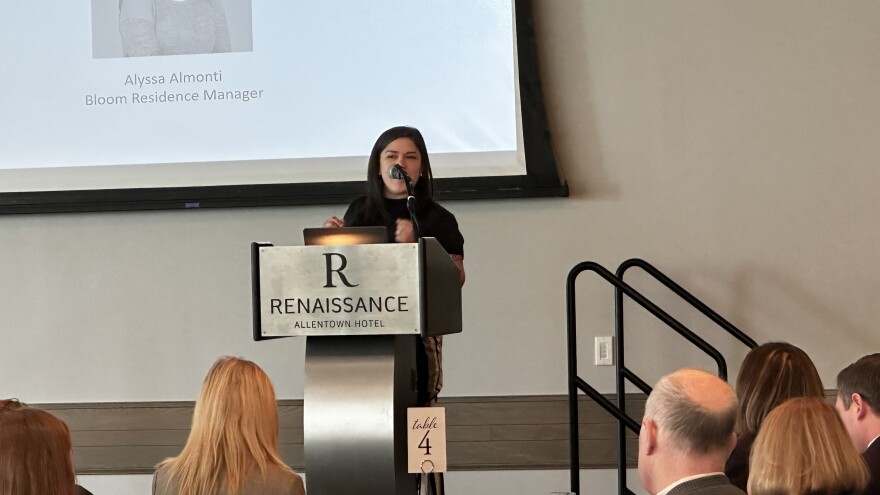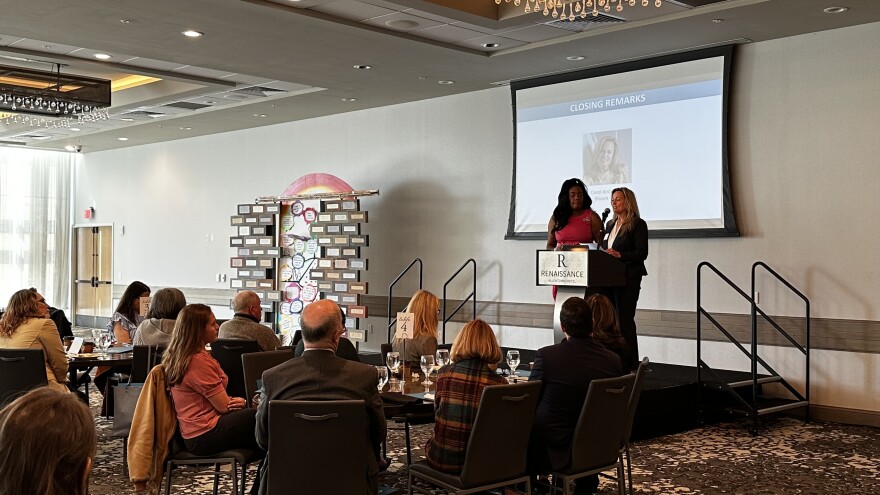ALLENTOWN, Pa. — Sheniqua Mitchell told a group of politicians, nonprofit workers and concerned citizens Thursday that sex trafficking is happening in the Lehigh Valley.
Mitchell, herself a sex trafficking survivor, now is outreach manager for Bloom, a faith-based non-profit that provides care and resources for victims of sex trafficking and sexual exploitation.
"I actually caught a mom preparing to traffic out her 10-year-old daughter. So it's happening right here.”Sheniqua Mitchell, outreach manager for Bloom
“Since I have been there, in the last year, I have come across three, three different trafficking situations with children," Mitchell told the group.
"I actually caught a mom preparing to traffic out her 10-year-old daughter. So it's happening right here.”
The gathering came together Thursday in Allentown to discuss the impact of human trafficking in the Lehigh Valley.
Members of Bloom, Homeland Security Agent Ashley Fernandez-Perez and U.S. Rep. Ryan Mackenzie spoke out on the presence of sex trafficking in the area.
They also spoke about the need for assistance for nonprofits such as Bloom to ensure victims get the justice, care and opportunities they deserve.
'We all carry dreams'
Bloom also took the opportunity to display The Bloom Barrier Wall Project.
A survivor-created installation art piece, it represents the challenges and dreams of trafficking survivors.
“There are overwhelming obstacles, but we believe that as a community of allies and survivors with vision, voice and resilience, we can do hard things."Bloom CEO Carol Andersen
Bloom Chief Executive Officer Carol Andersen recounted the story of a young woman who came to Bloom with a criminal record, the offenses “which were committed while she was under the control of those who profited off her pain.”
Despite aspirations to heal, get a job, a home and return to school, she faced barriers because of her past, Andersen said.
“We all carry dreams for ourselves, for our families, for the kind of world we want to build, and for those that we love and the community that we live in," she said.
"But survivors of trafficking and exploitation face barriers that most of us in this room will never experience: legal hurdles and deep, deep trauma and systems that weren't built with their stories in mind.
“Today, we're going to talk about those barriers. But even more importantly, we want to talk about the power we collectively have to remove them to our legislators and policy leaders in the room.”
Support for the victims
U.S. Rep. Mackenzie spoke about the victims counted in the latest federal human trafficking report, stating 2,900 prosecution cases across the country counted almost 11,000 victims.
“And those are just the ones we caught,” Mackenzie said.
Makenzie said that while much has been accomplished to combat sex trafficking across the nation, much work remains.
“We have a tremendous opportunity here as a local community, because of our collective action, everybody coming together to actually make positive changes,” he said.
“And it can start with getting involved in volunteering or donating like you are today, but make sure that that doesn't stop with your actions.
"So as you leave here, as you go out, make sure that you talk about this organization, post about it on your social media, do everything you can to get more people involved, because we are making positive change.”

'It doesn't stop'
Fernandez-Perez spoke about her agency’s work in the realm of sex trafficking, partnering with organizations such as Bloom to assist the victims.
She also referenced her work on the Lehigh Valley County Human Trafficking Task Force, which includes seven agents along with state and local partners.
“I just want to stress the importance of bringing awareness about human trafficking, and I can't thank Bloom enough for all the work that you do in bringing the awareness."Homeland Security Agent Ashley Fernandez-Perez
While many people think trafficking cases are akin to fictional accounts, such as the movie "Taken," Fernandez-Perez said traffickers “are so much more complex… they are smart and they know how to seek out that what is vulnerable in somebody.”
Protecting vulnerable people entails seeking them out at places such as hospitals, hotels, motels and other locations to find the victims and begin providing assistance.
“I just want to stress the importance of bringing awareness about human trafficking, and I can't thank Bloom enough for all the work that you do in bringing the awareness," Fernandez-Perez said.
"Because it doesn't stop. It doesn't stop once we arrest the trafficker, it continues on after that.”
She said helping victims navigate life after they get out of the sex trade helps to keep them from going back to it.
Bringing down the wall
Bloom Residence Manager Alyssa Almonti explained the concept behind The Bloom Barrier Wall Project, explaining the messages written on the piece represented the struggles sex-trafficking victims experience even after they exit the industry.
Requests for access to education, employment medical care, mental health care, and more is vital, Almonti said.
"This is about that stigma that continues to silence and isolate survivors, creating invisible walls for themselves,” she said.
Pulling the two slates of faux bricks apart unveiled achievements, milestones and hopes for the future from those same victims.

“Please take a moment to read every brick that you can," Almonti said. "These bricks represent real barriers. They're made by real survivors at Bloom. We don't just hear these voices. We amplify them.
“So we can dismantle this wall alone, and I'm asking you, of course, again, as legislators, leaders and community partners, to join us in breaking down these barriers.”
'We can do hard things'
Bloom graduate and employee Kelly Murphy spoke right after, reading a poem that detailed her voyage through sex trafficking, the lack of help for those like her, and how Bloom ultimately saved her.
"We know we can't do it alone. We need you, and we want to invite you to move forward with us."Bloom Chief Executive Officer Carol Andersen
“They taught me how to stand again/To build my life, to dream, to mend," she said. "A job, a voice, a way to fight/Not just survive, but claim my light.
"Yet laws still bind, still weigh me down/A system built to watch me drown/To those who sit in seats of power, will you rise within this hour.
"Not with words, but with your hands/Rewriting the laws that take a stand/Not with pity, not with blame/But clearing paths and changing names?”
Andersen closed out the ceremony by pointing out the extraordinary amount of work organizations such as lBloom do for victims, all without federal funding.
Even with $1.2 million in their budget for the year, “we need more,” she said.
“There are overwhelming obstacles, but we believe that as a community of allies and survivors with vision, voice and resilience, we can do hard things,” Andersen said.
“We say that often in the office, we know we can't do it alone. We need you, and we want to invite you to move forward with us.
"Let's build more than systems or services. Let's build hope, and let's build healing, and let's build second chances.”


